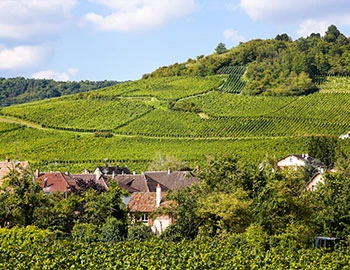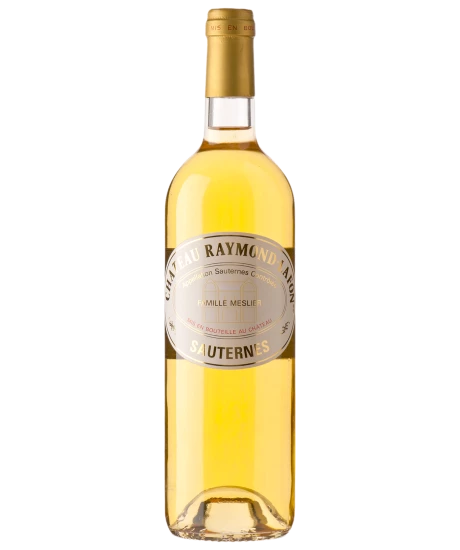Château Raymond-Lafon 2018
Château Raymond-Lafon 2018
AC Sauternes, 375 ml

Description
This golden elixir is the icing on the cake at the end of the feast. Let yourself be enchanted by the beguiling fragrance, followed by an followed by an opulent texture and a multi-layered, never-ending taste that is reminiscent of pineapple compote, dried apricot, saffron, honey and passion fruit. Supported by a fine acidity and with a sweet opulence opulence on the palate. Tip: Do as the French do and serve and serve this Sauternes as an aperitif with brioche and foie gras.
Attributes
| Grape variety: | Sémillon, Sauvignon Blanc |
| Producer: | Château Raymond Lafon |
| Origin: | France / Bordeaux / Sauternes, Barsac & Cadillac |
| Other bottle sizes: | 750 ml |
| Other vintages: | 2016 2010 |
| Ripening potential: | 5 to 25 years |
| Drinking temperature: | 6 to 10 °C |
| Food Pairing: | Cakes, biscuits, pastries, Fruit tart, Blue cheese, Foie gras |
| Volume: | 13.5 % |
| Note: | Contains sulphites |
Château Raymond Lafon
Located in the heart of the Sauternes area, this winery comprises 18 hectares, 16 of which planted with 80% Sémillon and 20% Sauvignon Blanc. The maximum yield by law is 25 hectolitres per hectare. The yields at Raymond-Lafon average only 8 to 10 hectolitres per hectare; in other words, one vine will produce only one glass of delicious wine. Over several pickings, the grapes are harvested one by one according to their level of maturity. In some years, this can result in up to ten selected hand harvests. This alone lets one appreciate the great value of this wine.
While it could not benefit from the Grand Cru classification of 1855, since it was founded only a few years later, Château Raymond-Lafon has been rated as one of the top wineries since its inception. In 1972, Francine and Pierre Meslier became owners of the castle. Pierre Meslier, an agricultural engineer from Montpellier, was able to develop his great experience in the Sauternes region at the legendary Château d'Yquem, where he was in charge of vinification for 26 years. His quest for perfection and excellence modelled after Yquem was transferred to Raymond-Lafon of course, and later passed onto his children, who are now responsible for the estate.
Each vintage from Château Raymond-Lafon delights us with its specific characteristics, with a firework of aromas and subtle sweetness, whether you decide to drink it young or mature. Served slightly chilled as an aperitif, it stimulates the palate. Raymond-Lafon is also a festive wine, which is best suited to delicious goose liver, oysters, game and poultry, soft cheese as well as pastries and desserts of all kinds. It is worth trying various combinations. It is a veritable delicacy that you can enjoy at an affordable price when compared to many neighbouring estates, above all Château d'Yquem.
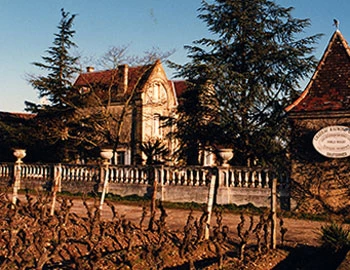
Sémillon
The fungi be thanked
The Sémillon grape is the basis of the legendary sweet wines of Sauternes. Its origins are there, in the southern part of the Bordeaux region. Its secret to success is its susceptibility to the Botrytis fungus, which pierces the skin of the ripe berries. Thus the water evaporates, and the sugar in the fruits concentrates. The musts are as thick as syrup. They present the citrus-fresh, fruity aromas of the Sémillon varieties. In addition, the Botrytis fungus contributes complex notes of honey, dry apricot and candied orange to the wine. The Sémillon is closely related to the Sauvignon blanc, and almost all sweet wines from Sauternes and its surroundings contain a small proportion of Sauvignon. The dry whites from Bordeaux are the opposite: the Sémillon mostly plays the supporting role. In early-19-century South Africa, Sémillon was the most planted grape. However, only vanishingly small quantities still grow there today. However, the vine has since taken root in California and Australia.
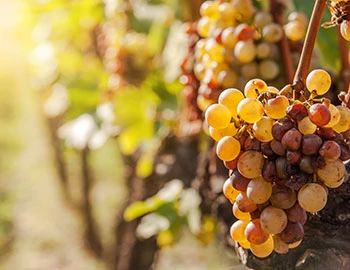
Sauvignon Blanc
The Sauvignon blanc can be recognized with your eyes closed. Its typical bouquet is marked by green notes: freshly cut grass, tomato bunches, gooseberry. Citrus fruits, cassis and flint join into the mix. In warmer latitudes it also shows exotic aromas, such as passion fruit. Its acidity is decidedly lively. In all likelihood, it comes from the Loire Valley, where it is vinified in Pouilly-Fumé and Sancerre in its purest form: varietally, and without timber. In the 18th century, it found its way to Bordeaux. Ambitious producers assemble it there with Sémillon into substantial whites, which are aged in oak barrels. The Sauvignon blanc has been a sensational success in the past 20 years in New Zealand. With its refreshing sweet-and-sour style, winemakers from down under have conquered the world. The rich Sauvignons from Styria and crisp examples of South Tyrol and Friuli are worth mentioning as well. It pairs with anything from the sea. Or do it like they do on the Loire, and enjoy it with goat cheese.
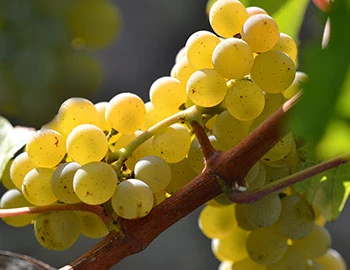
Bordeaux
Bordeaux: high prestige, high quality
With a total area of around 115,000 hectares, Bordeaux may not be France’s largest wine-growing region, but it is certainly its most prestigious. The range of wines produced here today is enormous: ranging from red everyday wines with a great relationship between price and quality to exclusive, and accordingly expensive, premier crus. Elegant white wines and noble sweet specialties round out the spectrum.
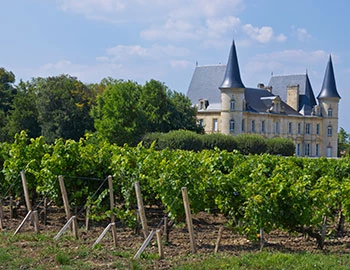
France
France – Philosophy in a bottle
According to French philosophy, wine should be an expression of the soil and climate. They use the word “terroir” to describe this. Terroir makes every wine different, and many especially good. French wine is regarded worldwide as an expression of cultural perfection. The French believe that humans are responsible for the quality of the berries, the vine variety for their character, and nature for the quantity. This philosophy can be expressed succinctly as: “the truth is the vineyard, not the man.”
